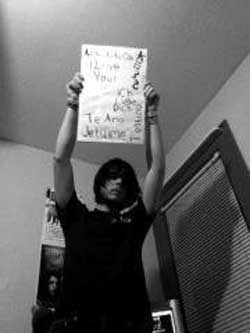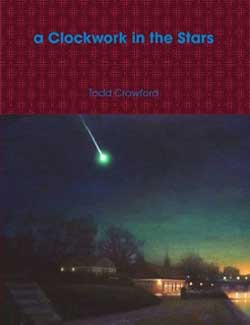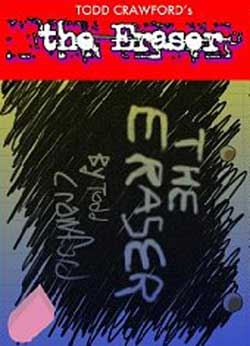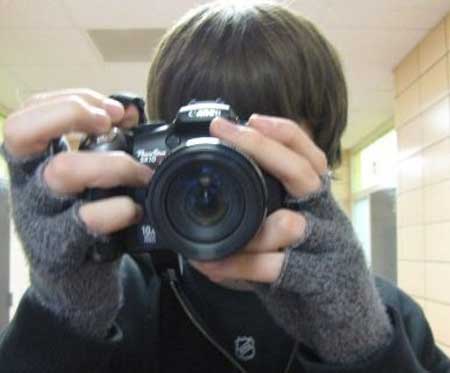 Most people today bitch and moan about the younger generation. They claim that they are lazy, selfish, and don’t have any respect for anything. Obviously these people have never met Todd Crawford. Todd is only eighteen but he has already published several novels and short stories, and is a walking encyclopedia of all things horror related. He is an intelligent, articulate young man and I see some huge things in store for him in the near future. Mark my words, one day he is going to be a well-known horror author with a huge fan base, and I feel very fortunate to call him a friend (plus his name is Todd and as we all know people with that name rule). I recently got to speak with him on the topic of horror and other things, and this interview follows:
Most people today bitch and moan about the younger generation. They claim that they are lazy, selfish, and don’t have any respect for anything. Obviously these people have never met Todd Crawford. Todd is only eighteen but he has already published several novels and short stories, and is a walking encyclopedia of all things horror related. He is an intelligent, articulate young man and I see some huge things in store for him in the near future. Mark my words, one day he is going to be a well-known horror author with a huge fan base, and I feel very fortunate to call him a friend (plus his name is Todd and as we all know people with that name rule). I recently got to speak with him on the topic of horror and other things, and this interview follows:
Todd Martin: So when did you first start writing? What sort of stuff did you write when you first started?
Todd Crawford: I began writing creatively at the age of 8. I had always drawn and written since much further back than my memory can reach, but the first time I ever really remember writing was when I was 8 and I was working on a series of comic books in the vein of South Park, or Celebrity Death Match. That was my first original work, and I took it very seriously. I would write and draw all day rather than doing my schoolwork. I was also in and out of more babysitters than any child should be exposed to, so I spent a majority of my time at home that way as well. I would fill entire notebooks up with comics in this series, and they were all very methodical and calculated. It had story arcs, continuity, much more than one would expect from a kid my age. When my mother found these stories, she forced me to go to counseling for a year, but in a way, my stories were an escapist therapy session from all of my real-world problems. I think that as of the past year I’ve really rediscovered that connection to my work and I always relate my writing to the old EC comic books in terms of creativity. I try to let ideas come to me very naturally and expand and compound them until I have this very complex foundation laid thematically, characteristically, and all else that I may need when the time comes to write the story. I just came up with the concept for my next novel after The Pilgrimage talking with a fellow author friend, Jaidis Shaw. We were discussing mermaid mythologies and I turned it into this Paradise Lost mythology that climaxes in Tokyo with this fantastic Kaiju battle. I really want to bring the story back in my storytelling, as the last few books were very much expressionist pieces of emotion more so than visions.
TM: What books have you written? Give us a synopsis of each one.
TC: Well, only counting the books which are currently available, I have written a Clockwork in the Stars, which deals with two teenagers who discover a gear from the sky has fallen to Earth inside of a meteor. It’s both a satire on books such as Twilight as well as an autobiographical account of my year as a 13 year old. A lot of the dialogue and relationships between characters were lifted from my life and pressed onto the page. My next book is titled The Final Gospels. It was originally a biography of this fictitious band that rises to stardom and is torn apart by disease and drug-addiction, but it wound up being the tale of two angels exiled from Heaven to Hell and how one can find Light in the Darkness, as well as Corruption within the Absolute. It was also plagued with a good deal of grief and mocks my own depression and suicidal tendencies I was suffering from at the time. Finally, I have released The Black Season on September 11th, 2011. Whereas the past two novels were about my relationships to others, this book was about my relationship with myself in the form of this narrative anthology. The title is derived from a scene in the graphic novel Uzumaki, which inspired quite a bit of a Clockwork in the Stars, where a man is cremated and the ashes blot out the sky. It was my way of saying “I could pull a Cobain and kill myself in order to gain recognition, and everybody would look back on this book and marvel at how brilliant it is, but instead I’m going to do this the right way, no matter what recognition that I may or may not receive.” Thus far, it is my most popular book yet and I can’t wait to release it for the first time ever on the Amazon Kindle. The short stories reviewed on there (I think of them as singles released to promote a concept album) have been very well received, so I can’t wait to hear people’s opinion on them all in the context of The Black Season.
 TM: What short stories have you written? Tell us about them as well.
TM: What short stories have you written? Tell us about them as well.
TC: Quite a few! Just to name some of them that are available right now, there are: “The Eraser,” which is a superhero tale of a man with very severe anger issues (while living a very stressful life) who realizes that not only can he destroy others’ existence, but he can “Erase” them from ever having lived! “Brighter” is the first story in the Constellations series (“Brighter,” Clockwork, “Just another Star,” The Final Gospels, “Darker”) and is a favorite to many of my long-time readers. I’m very proud to have finally released that after having written it when I was 12. I don’t think that I’ll be releasing any short stories individually from now on, because it isn’t possible yet to offer them for free, something of which I had been mistaken of while I was planning the re-release of all my available works for the Amazon Kindle, but come September 9th The Black Season will be out digitally for the first time and that is much more worthy of its ticket price.
TM: What is your favorite piece that you have written and why is it your favorite?
TC: I can’t name a favorite piece because they are all reflections of myself that I love equally (although I have never been one to believe in equality). There are many aspects of a Clockwork in the Stars that I wish I could replicate, and The Black Season has some really touching moments to look back upon after having spent a good 5 years on it. I could play it the safe route and say that my upcoming novel, The Pilgrimage is my favorite, and although I truly believe that it will be much better than anything I have worked on in the past (why write it otherwise!?), I don’t think I would do its kin such a disservice as to write them off (literally) as inferior. I love all my stories, even the terrible ones (which I try to lock up in three-ring binders lining the wall of my bedroom).
TM: Do you prefer writing novels or short stories? Any plans to start writing screenplays?
TC: I really enjoy both formats. Writing novels gives you much more time to connect with the characters and spend many sleepless nights as an author just astounded that such a thing could ever come from your mind. They are also much easier reading, because you only have to connect with one story, one set of characters. Short fiction is much more demanding of both the readers and writers. With that said, though, I grew up on George A. Romero and Stephen Kings’ Creepshow, an it has inspired me to look further into anthological themes (such as the EC comics aforementioned) that I love to see my own short literature as. You have a very basic starting point and you just have to run with it. I find that very challenging and exciting. It also gives me that rush of formulating an entire story in minutes and then sitting down to write it in one or two nights. They are both very rewarding, in summation. I’ve been writing screenplays as long as I have been anything else! My original goal in life after owning a comic book shop was to be a film director (and direct A Nightmare on Elm Street 9, naturally), so I’ve read and practiced writing quite a few screenplays. I know that I have the screenplay for the Horror anthology Flesh, Pain, and Manipulation, that I wrote when I was 11 lying around here in my room as I type this. I like to merge all of my obsessions and spread them out in as many ways that I can.
 TM: Tell us a little about yourself. What do you do when you aren’t writing? Do you have any hobbies or interests you’d like to talk about?
TM: Tell us a little about yourself. What do you do when you aren’t writing? Do you have any hobbies or interests you’d like to talk about?
TC: Typically when I’m not writing I’m on long walks. I used to prefer walks through the woods, or in secluded areas, but just lately I’ve found an obsession with walking down Main Street in my hometown. It’s very isolating knowing that there are people in every store or coffee shop (hint hint, as to the opening scene of The Pilgrimage) and yet I am not invited, nor welcome, in any. I enjoy that feeling, and it is a very pleasant melancholy that overcomes me when I do so, especially during the later hours of the night.
TM: What is your favorite horror film of all time? Your favorite horror novel?
TC: My favorite Horror film of all time is without a doubt A Nightmare on Elm Street by Wes Craven. Were it not for this masterpiece I would have never become the Artist or the fan that I am today. I love the sequels, the comics, the novel adaptations, everything about the series that began with this (remake excluded, of course). I even wrote my own ending to the series which is included in The Black Season, titled A Nightmare on Elm Street 9: The Dream Demon. I am willing to email that to fans of the series for free, as I feel the remake was made with the intention of making money with no consideration for the fans. The Johnson family, a certain doctor from the Dream Warriors, Freddy’s malignant side, it all returns and I did my best to bring the series a sense of finality. My favorite Horror novel (getting back on topic, my bad!) is going to have to be The Hellbound Heart by Clive Barker. I must have read it a dozen times, as it was my first Barker novel, and it got me addicted to his Artistic philosophy. I had always been pushing the boundaries of eroticism and violence in human nature, but after reading Clive Barker I knew that I had to step up my game. He very easily could have taken the prefix out of The Inhuman Condition and it would be the most fitting description of his characters. It’s not that I haven’t enjoyed other Horror novels as much (I’m sure there are others), but none have affected me or my lifestyle so profoundly as this has.
TM: If you had to name the scariest movie of all time what would you say it was and why?
TC: Up until this year I would have told you BEGOTTEN by Elias Mehrige, but after seeing the film The Poughkeepsie Tapes I am converted. I couldn’t shower without checking behind my curtain for days after watching it. I would have nightmares that I woke up in that basement (without giving away any spoilers). There were plenty of moments that literally took my breath away, even knowing that the film was a faux. I can immerse myself very easily in those kinds of films and make believe, so it’s easy for me to really get the whiplash that many of them are going for. With that said, though, I’m more of a Blair Witch Project/Guinea Pig: A Flower of Flesh And Blood kinda guy than I’ll ever be Cloverfield, which was severely lacking in my opinion. Chronicle is a masterpiece, though, and takes the crown of the genre in the storytelling aspect.
TM: Who would you say were some of your influences when it comes to writing?
TC: As I stated above, Clive Barker will always be the godfather of my writing, and Stephen King will be the uncle who sat me on his lap and read me bedtime stories. Even including them, though, my biggest influence has always been myself. I ask myself “What would I want to read?” or will gauge the effectiveness of a key scene based on my own reaction. If something isn’t scary enough to keep me up at night, or it isn’t funny enough to have me cracking grins as I write the lines, then it isn’t worth sharing with others. It may sound narcissistic, but self-indulgence is the subject of my book, The Pilgrimage, so we’ll just call it research for the book (laughs).
TM: How old were you when you published your first book, and how did your classmates or teachers react when they found out that you had done so?
TC: I was 14 by the time my first book was published, and it had been complete for over half a year by the time I was recommended self-publishing. The reaction to the book was underwhelming, to say the least. Nobody cared, and there was no reaction at all. I did my best to market the book, but as a 14 year old kid with no expertise on the subject it’s quite easy to realize how I failed. My next book actually got some publicity in the local newspaper as well as the school news, and by The Black Season I was booked for a book signing at the Greenville Area Public Library to debut its release! Now, before The Pilgrimage is even out, I’ve been accused of rallying people for revolutions and Fascism, as many have taken the promotional slogan “I propose a genocide” out of context. The book deals with Fascism to oppress conformity, a genocide of morals, rather than of mortals. So you can say that I’m always trying to outdo myself in that regard as much as any other. I have much greater things planned with my next two books, and I don’t think anybody can estimate them or their effect until they have arrived, no matter how humble my beginnings may have been.
TM: Any projects you are working on right now you’d like to talk about?
TC: Always! I’m currently working on a novel titled The Pilgrimage, which is basically the E! True Hollywood Story of The Antichrist’s rise to fame politically, told from a completely grounded, agnostic point of view. It never comes right out and gives confession as to whether or not this man is affiliated with the Dark Arts, but I think that there is a lot within the story that can be uncovered through that ambiguity. It’s a great moral dilemma of “If these people can’t handle themselves, then how must I as their leader rule them?” and in the end he realizes that the only individual he has control over is himself. It’s really a love-letter to classic literature such as Milton’s Paradise Lost and The Divine Comedy of Dante Alighieri. Although I tease the idea of the more traditional Horror archetypes, it is more about a more intimate, personal terror of “What am I capable of?” and “What is society capable of?” One could liken it to The Dark Knight Rises, because I also looked to the French Revolution and Dickens’ A Tale of Two Cities.
TM: If you had the opportunity to write a novelization of any horror film what would be your choice?
TC: Well, I’ve written many novelizations of the A Nightmare on Elm Street series, both of films that were made (particularly The Dream Master) and my own sequels. I’ve also written a short story immediately following the ending of the Producer’s Cut of Halloween 6: The Curse of Michael Myers involving Dr. Loomis and how he comes to terms with his role as this Ahab character. He was always my favorite character in the series and his dynamic with Michael Myers was the true selling point of the series to me.
TM: What advice or tips would you give any other writers out there?
TC: My best advice has always been to just be honest. Don’t condescend to the audience or to the story, because they don’t want to be treated like children (even if you’re writing a children’s book). No matter how good or bad of a writer you may currently be in the sense of technical proficiency, you can improve. The important thing is to write the stories you would want to read, and to write them honestly.
TM: Want to give a shout out to anyone or add anything else?
TC: For sure! I should mention Diego Valenzuela, whose book, Reverie of Gods, I have been reading all summer long. Jaidis Shaw has helped me a ton the past few months and we’ve developed a very neat relationship as fellow authors and as friends. I should also give a shout-out to you, and everybody associated with Horrornews.net for giving me this great opportunity to be featured here. I really do appreciate it!
Thank you Todd for taking the time to speak to me!
Interview: Author Todd Crawford
 Horror News | HNN Official Site | Horror Movies,Trailers, Reviews
Horror News | HNN Official Site | Horror Movies,Trailers, Reviews
